9 Best Home Remedies For Stuffy Nose
Pooja Angurasu
Numerous variables, including allergies, viral infections, environmental influences, and many more, can contribute to stuffy noses. Breathing becomes difficult for someone with a stuffy nose, and at times it swells and hurts. Here are the best nine home remedies for stuffy noses that can be made at home and are quick and simple to prepare. They are natural, effective, and inexpensive. Now let's get started.
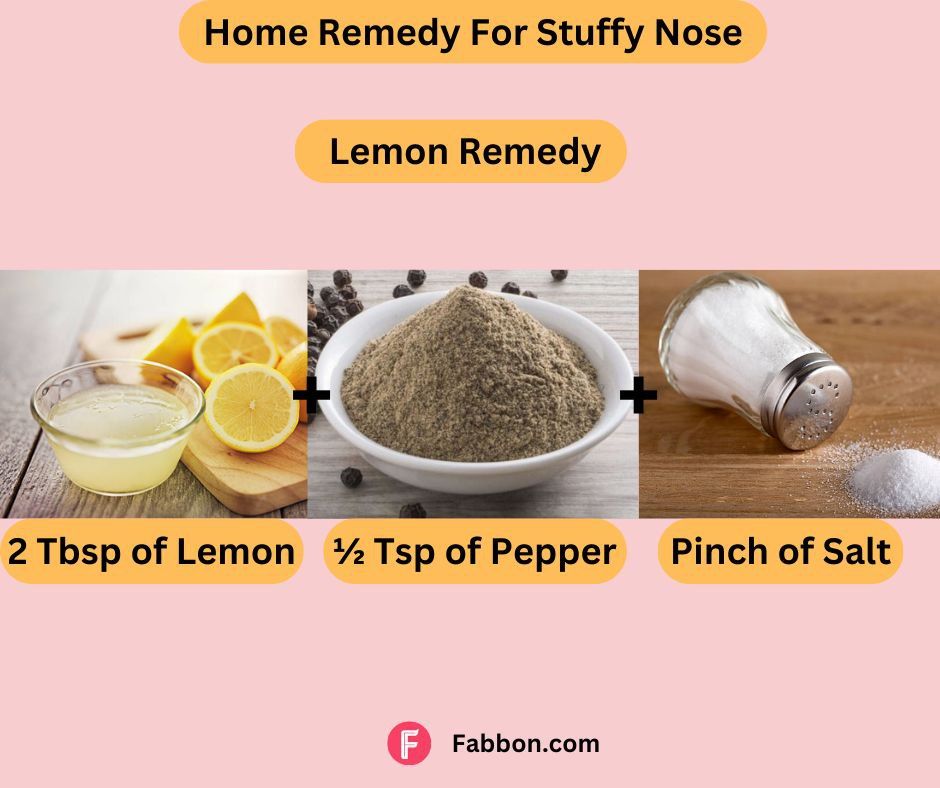
1. Lemon Remedy
Ingredients:
- 2 tablespoons of lemon juice
- 1/2 teaspoon of pepper
- Pinch of salt
Procedure:
-To two tablespoons of lemon juice, add a half teaspoon of pepper.
-Sprinkle in some salt.
-Combine it well and dab it on the area surrounding your nose.
-After 10 minutes, give it a wash in warm water.
Frequency: Twice a day
Why it Works: The smell of lemon has an energizing and revitalizing impact that may aid with nasal channel clearance. Lemon's bioflavonoids not only soothe and moisturize inflamed nasal passages, but they also help decrease swelling inside the passages, relieving congestion. Pepper contains piperine, which thins mucus and facilitates its removal from the nasal passages. Pepper's anti-inflammatory properties aid in lessening nose passage irritation. Salt relieves rashes and keeps the skin from drying out. This is one of the greatest home remedies for stuffy noses.
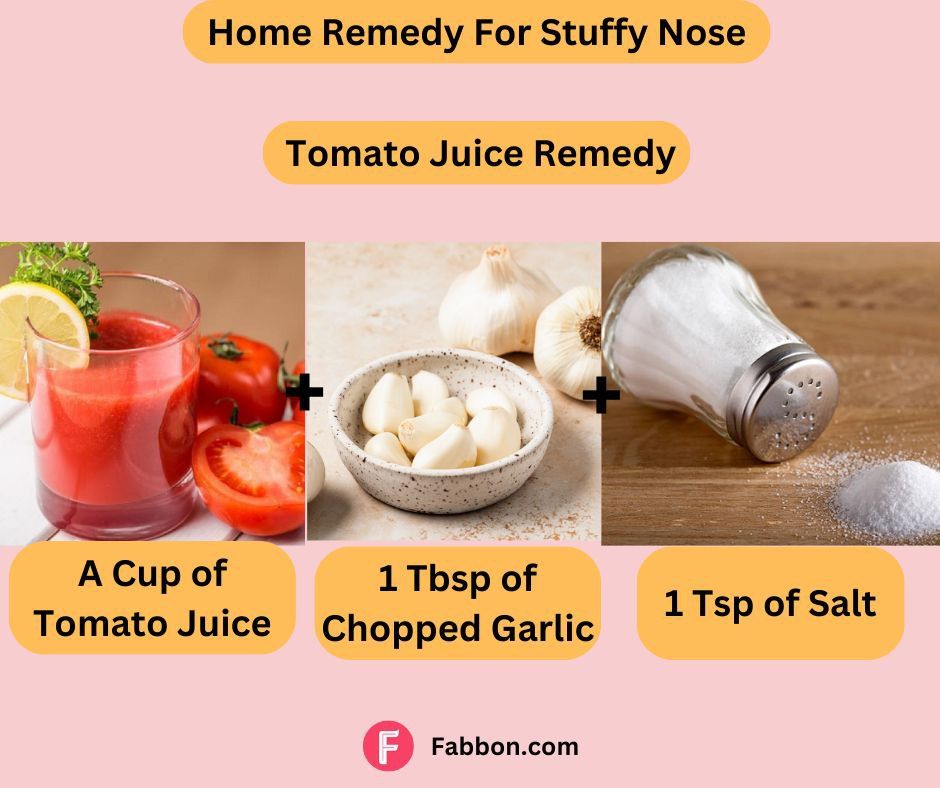
2. Tomato Juice Remedy
Ingredients:
- A cup of tomato juice
- 1 tablespoon of chopped garlic
- 1 teaspoon of salt
Procedure:
-Put one tablespoon of finely minced garlic into a tomato juice cup.
-Stir in one teaspoon of salt.
-Savor the beverage.
Frequency: Twice a day
Why it Works: One of the most popular home remedies for a stuffy nose is the tomato because it helps to stay hydrated, which is necessary for thinning mucus and maintaining moisture in the nasal passages, both of which can ease congestion. Garlic and tomatoes work together to promote nasal evacuation, which may help reduce congestion. Natural anti-inflammatory agents found in salt help to relieve congestion by reducing nasal channel edema.
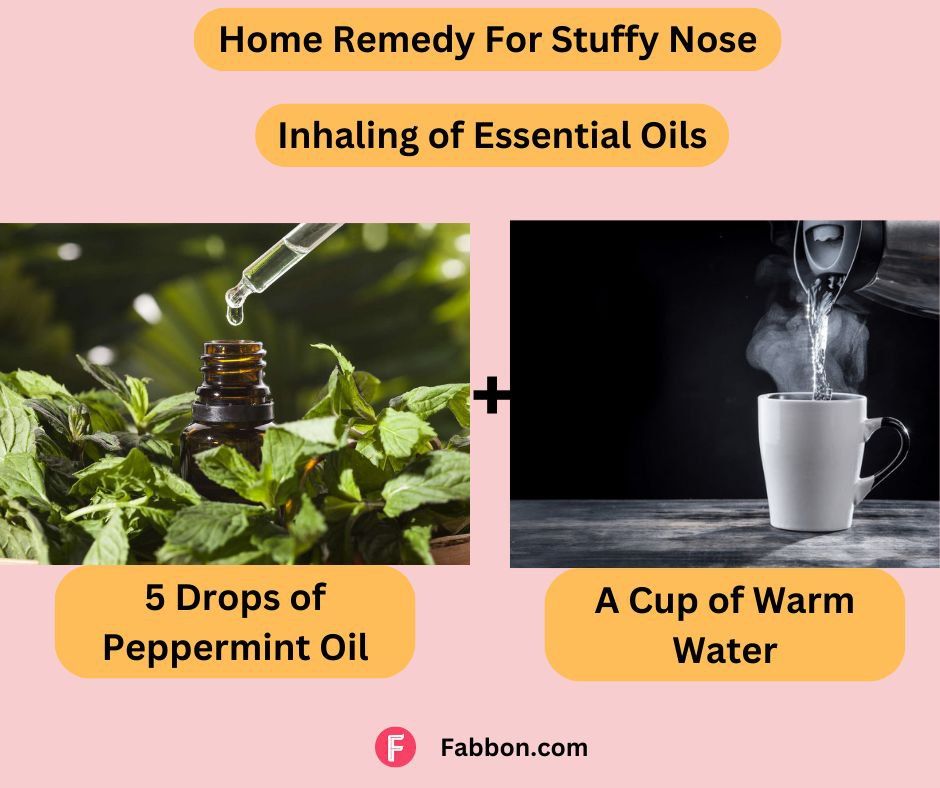
3. Inhaling Essential Oils
Ingredients:
- 5 drops of peppermint oil
- A cup of warm water
Procedure:
-Fill a cup with warm water and add five drops of peppermint oil.
-Spend 20 minutes inhaling the essential oil's odor.
Frequency: Twice a day
Why it Works: Since peppermint oil naturally includes a decongestant, it's a wonderful home remedy for stuffy noses. Inhaling the scent of peppermint oil can help remove congestion, widen nasal passages, and facilitate better breathing. When hot water is added for steam inhalation, peppermint oil strengthens the decongestant properties of the steam and relieves nasal congestion. Peppermint's menthol provides a cooling effect that helps relieve congestion-related pain and soothe inflamed nasal passages.
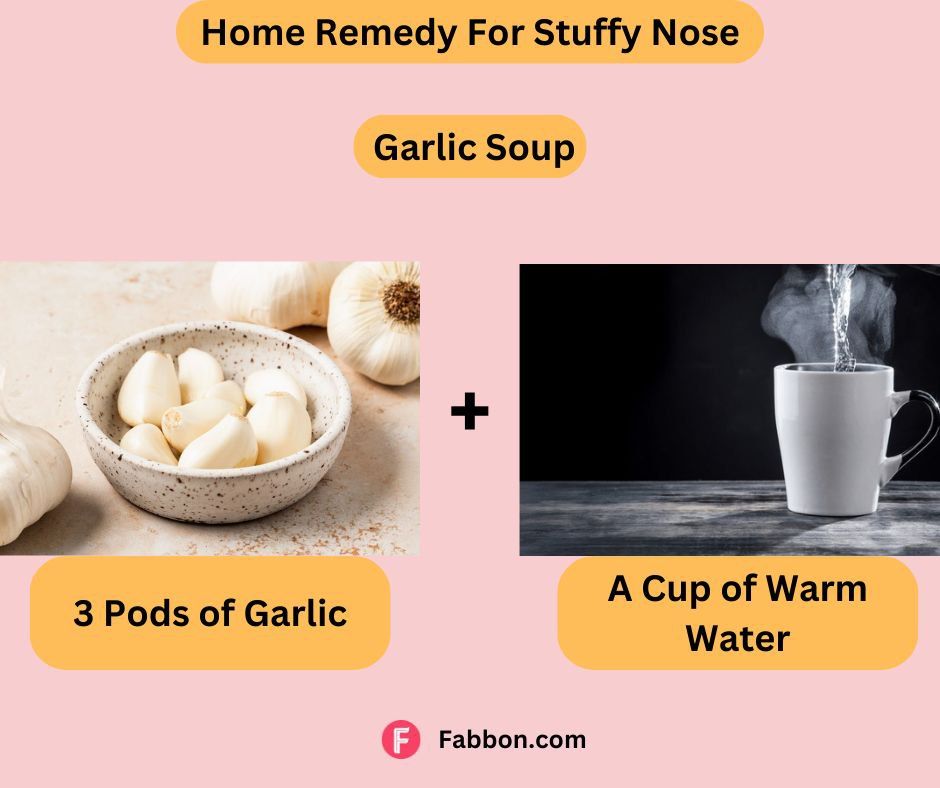
4. Garlic Soup
Ingredients:
- 3 pods of garlic
- A cup of warm water
Procedure:
-Add the three crushed garlic pods to a cup of boiling water.
-Give it a whole three minutes.
-After straining the water, savor the hot garlic soup.
Frequency: Twice a day
Why it Works: Rich in immune-supporting chemicals and antioxidants, garlic is a vital home remedy for stuffy noses. Boosting your immune system will assist your body in warding off illnesses that could lead to stuffy noses. Nasal passages can be made clearer by drinking garlic soup. Garlic's anti-inflammatory and antimicrobial qualities aid in the battle against infection and inflammation, clearing nose congestion and facilitating easier breathing.

5. Ginger Tea
Ingredients:
- Chopped ginger (as required)
- 2 cups of warm water
Procedure:
-This cure can be taken with tea or used as a compress.
-Add the necessary quantity of finely chopped ginger to two cups of boiling water.
-Give it a fifteen-minute boil.
-Soak a towel in the liquid, then gently apply it to your face for fifteen minutes.
-Alternatively, eat it with tea.
Frequency: Twice a day
Why it Works: Ginger's mucolytic qualities aid in the breakdown and removal of mucus from the respiratory system. This type of treatment is a top home remedy for stuffy noses since it helps open up nasal passages and facilitate breathing. Studies have demonstrated the antiviral and antibacterial qualities of ginger, which may aid in the treatment of the underlying infections producing nasal congestion.Bioactive substances found in ginger, such as gingerol, have strong anti-inflammatory properties. These qualities have the potential to lessen nasal passageway irritation, which will ease congestion and improve airflow.
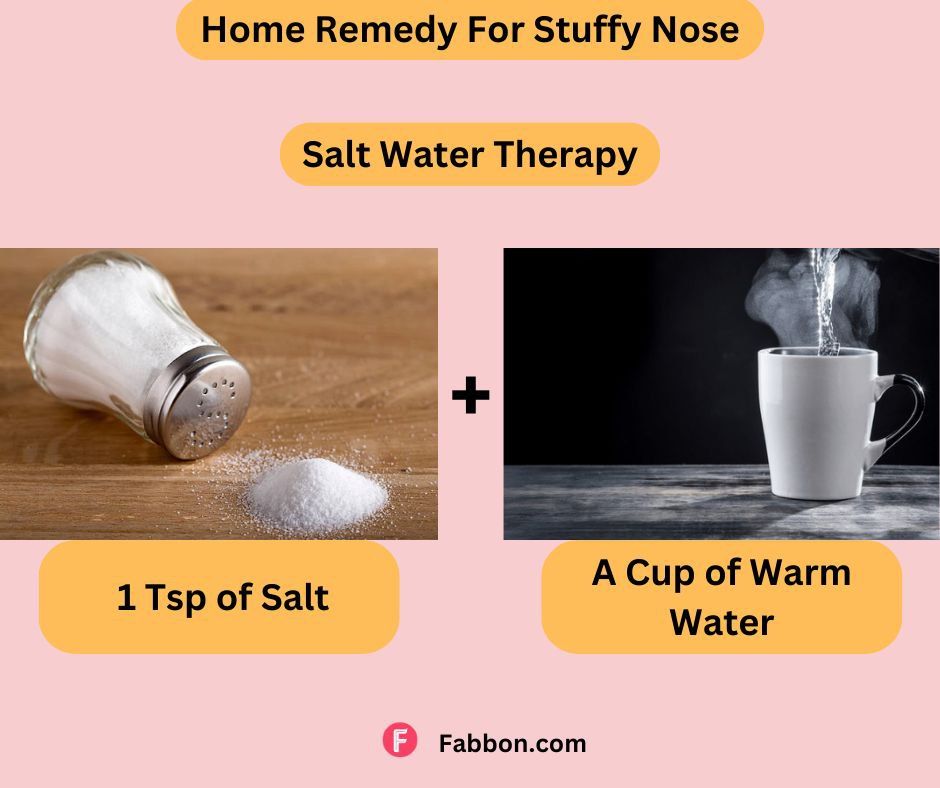
6. Salt Water Therapy
Ingredients:
- 1 teaspoon of salt
- A cup of warm water
Procedure:
-In a cup of warm water, add one teaspoon of salt.
-Using a dropper, pour the solution into the nostrils.
-Spit the solution out after five minutes.
Frequency: Once a day
Why it Works: This saltwater therapy helps clear mucus, allergies, and irritants from the nasal passages, relieving congestion. It is a beneficial home remedy for stuffy noses. The nasal passages are kept from drying out by the use of saline solutions. Saline solutions can enter the sinus cavities and help flush out bacteria and mucus that have become lodged there. This can ease the symptoms of sinus congestion and lower sinus pressure. In addition to reducing inflammation, salt water's anti-inflammatory properties can enhance airflow and ease congestion.
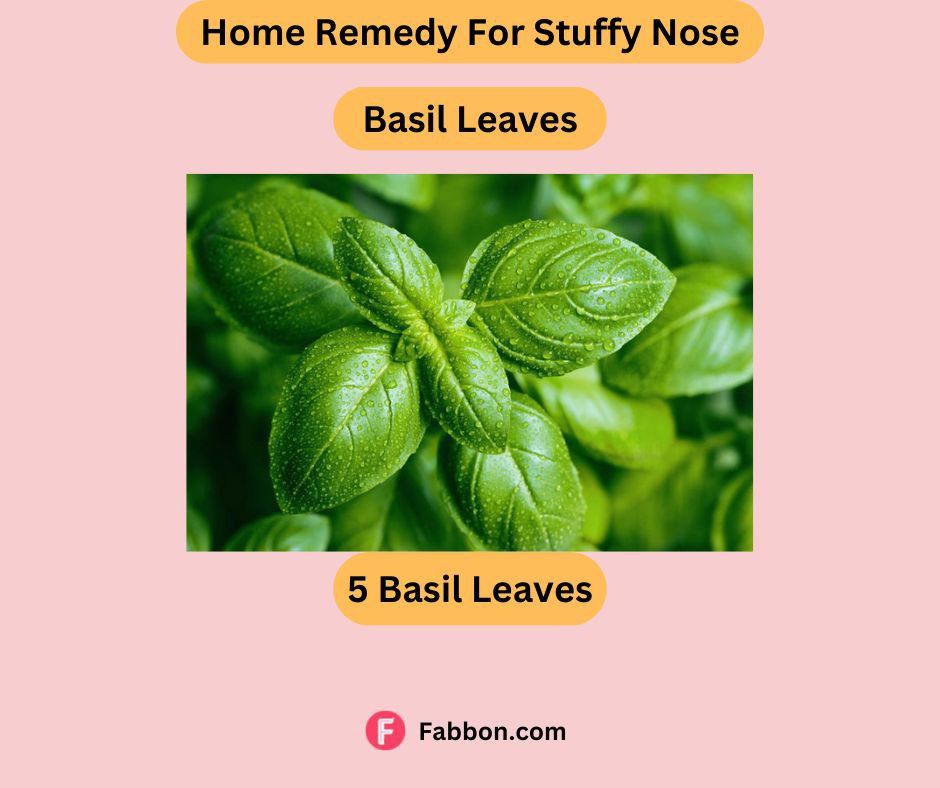
7. Basil Leaves
Ingredients:
- 5 basil leaves
Procedure:
-Simply chew five basil leaves after supper and before breakfast.
Frequency: Twice a day
Why it Works: The expectorant properties of basil facilitate mucus ejection from the respiratory system, facilitating easier breathing for the person. One of the simplest home remedies for stuffy noses is this.As a natural decongestant, basil leaves can help relieve congestion and lessen nasal channel puffiness. Eating basil leaves helps ease stuffiness and encourage nasal discharge. Antioxidants, which are abundant in basil, aid in the body's defense against dangerous free radicals. Additionally, tranquility is the potential impact of the fragrant molecules that basil releases.
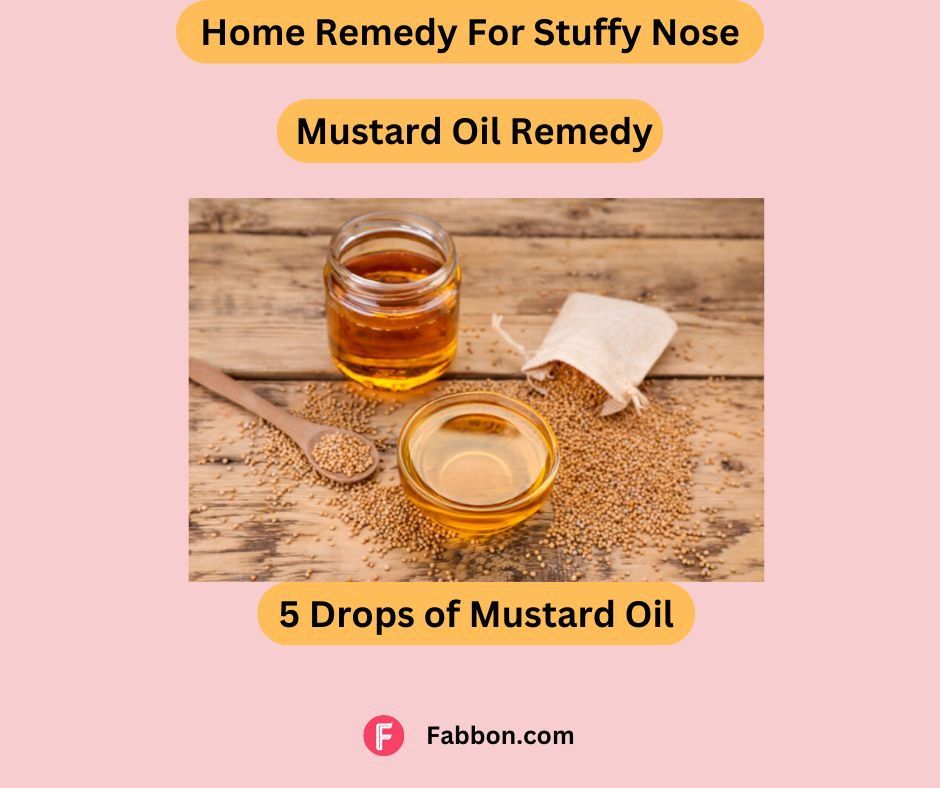
8. Mustard Oil Remedy
Ingredients:
- 5 drops of mustard oil
Procedure:
-Simply apply five drops of mustard oil to your nose and massage it in gently.
-After 15 minutes, give it a quick rinse with water.
-It's also optional to put two to three drops of mustard oil inside the nostrils.
Frequency: Once a day
Why it Works: The moisturizing and mucolytic properties of mustard oil can aid in keeping the nasal passages hydrated and help clear the respiratory system of mucus. Due to its antiviral and antibacterial qualities, mustard oil could potentially be able to treat the underlying illnesses that are producing nasal congestion.Compounds with anti-inflammatory qualities, such as allyl isothiocyanate, are found in mustard oil. These qualities have the potential to lessen nasal passageway irritation, which will ease congestion and improve airflow. It's also an effective sinus relief cure.
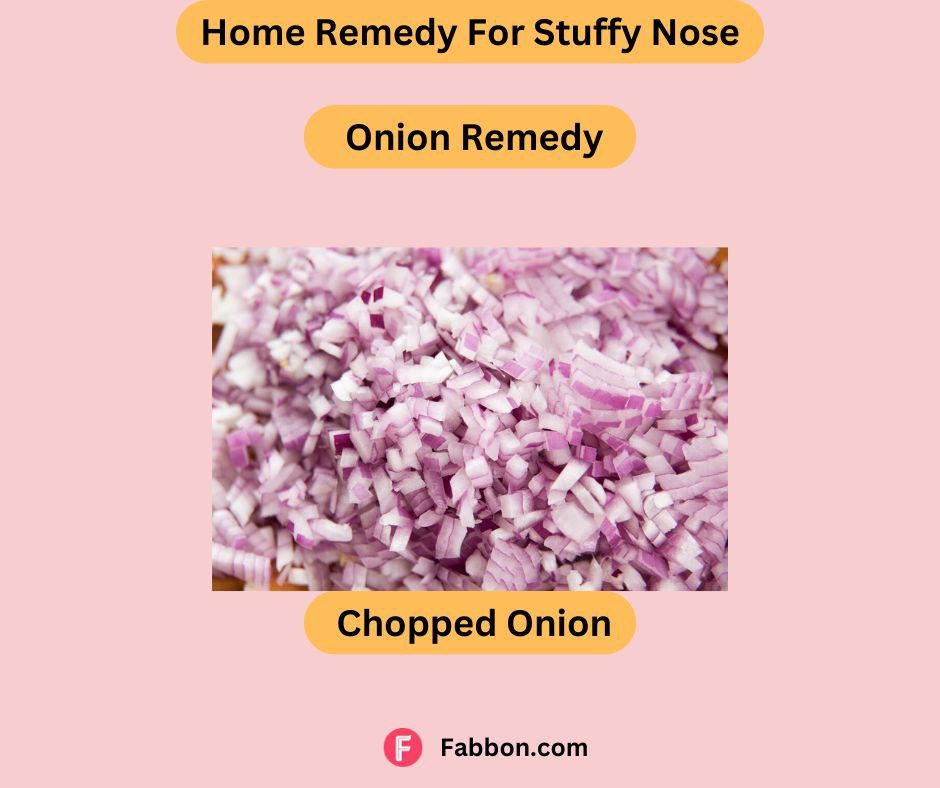
9. Onion Remedy
Ingredients:
- Chopped onion (as required)
Procedure:
-Cut an onion into pieces.
-Take five minutes to smell the onion.
Frequency: Once a day
Why it Works: Nasal congestion can be relieved by inhaling the onion aroma. The most potent home remedy for stuffy noses is onions because of their sulfurous components, which can also have a calming effect. Antioxidants found in onions, especially quercetin, lower oxidative stress in the body and aid in the body's defense against infections that could aggravate nasal congestion. Allicin and quercetin, two substances found in onions, have antiviral and antibacterial qualities, which lessen nasal congestion. As natural expectorants, onions can aid in the release and removal of mucus from the respiratory system, facilitating easier breathing.
Disclaimer: The information in this article should not be construed as professional medical advice; rather, it is meant to serve as general information only. For guidance on any medical problem, always seek the opinion of a licensed healthcare provider or physician.


























